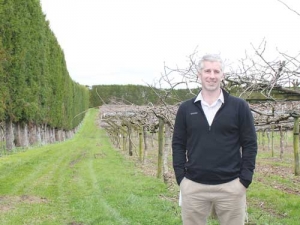MPI Hails Kiwifruit Boom as Horticulture Revenue Surges Past $9 Billion
Ministry for Primary Industries (MPI) Director General Ray Smith is giving a big shout-out to the horticulture sector, especially kiwifruit.
 MyFarm national sales manager Grant Payton at the existing kiwifruit orchard which will form part of a new venture just south of Auckland.
MyFarm national sales manager Grant Payton at the existing kiwifruit orchard which will form part of a new venture just south of Auckland.
The strength of the kiwifruit industry was a key factor behind MyFarm’s second kiwifruit venture, a proposed $9 million orchard development in the Franklin district, just south of Auckland.
Zespri’s sound marketing and value-add strategy contributed to MyFarm’s decision to get into kiwifruit rather than take other paths it had investigated, national sales manager Grant Payton told Rural News.
MyFarm has traditionally been a dairy investment company and latterly moved into sheep and beef. The Franklin plan is its second kiwifruit venture; the first is in the Bay of Plenty.
The company wants to raise $9 million for the Karaka Orchards Ltd Partnership, which would buy 42ha of bare land plus a 24ha established green kiwifruit orchard. The orchards would be managed and developed by a vertically integrated orchard, management, pack house and cool store operator, Punchbowl Packco, which has grown kiwifruit in Franklin since the early 1980s and owns or leases 17 orchards in the Auckland region. It is majority owned by the Craig family and directors include Comvita and Craigs Investment Partners chairman Neil Craig.
Executive director Andrew Watters says orchard land values in Auckland are much lower than in the Bay of Plenty, where a development could cost 40% more.
Payton says MyFarm’s first kiwifruit venture was to buy orchards in the Bay of Plenty where they work with orchard manager GroPlus.
The Franklin proposal is on a larger scale. Long-term investors with a minimum of $250,000 are sought. Cash from the existing orchard would help fund development; no cash returns are forecast for the first five years but returns of at least 9% are seen long term.
Payton says the green crop yield of the existing 24.6ha Punchbowl orchard at Kingseat has averaged 10,300 trays annually over the last five years; the Bay of Plenty average is about 8500-9000 trays.
The planned greenfields orchard, which will be converted to 30ha of green kiwifruit, will use artificial shelterbelts. Payton says these are instant, don’t compete for water and nutrients, and allow vines to be planted right up to the shelter; horizontal artificial belts are being assessed for the site, which give more protection from the elements.
They plan to take over the greenfields site from March 1 next year. They will start building the artificial shelter then plant over the next two-three years, staggering the planting and development.
As funds are generated from the existing orchards, the profits will offset the need for debt and extra capital from investors, he says. They also see potential to develop the existing orchard.
The new orchard will also be planted in green with the option to buy licences to grow new varieties when they are released.
Regional plans show the area being targeted for doubling of production and population in the next 30 years so there would be a capital gain for investors, Payton says.
While dairy farms have been its traditional model, the company always intended to add other products.
“Before we moved into kiwifruit we did a lot of research into other sectors and kiwifruit is one we found a lot of affinity with because of the strength of Zespri, the size, the cooperative structure and its sound strategy of adding value to its products.”
Fonterra’s impending exit from the Australian dairy industry is a major event but the story doesn’t change too much for farmers.
Expect greater collaboration between Massey University’s school of Agriculture and Environment and Ireland’s leading agriculture university, the University College of Dublin (UCD), in the future.
A partnership between Torere Macadamias Ltd and the Riddet Institute aims to unlock value from macadamia nuts while growing the next generation of Māori agribusiness researchers.
A new partnership between Dairy Women’s Network (DWN) and NZAgbiz aims to make evidence-based calf rearing practices accessible to all farm teams.
Despite some trying circumstances recently, the cherry season looks set to emerge on top of things.
Changed logos on shirts otherwise it will be business as usual when Fonterra’s consumer and related businesses are expected to change hands next month.

OPINION: Here w go: the election date is set for November 7 and the politicians are out of the gate…
OPINION: ECan data was released a few days ago showing Canterbury farmers have made “giant strides on environmental performance”.